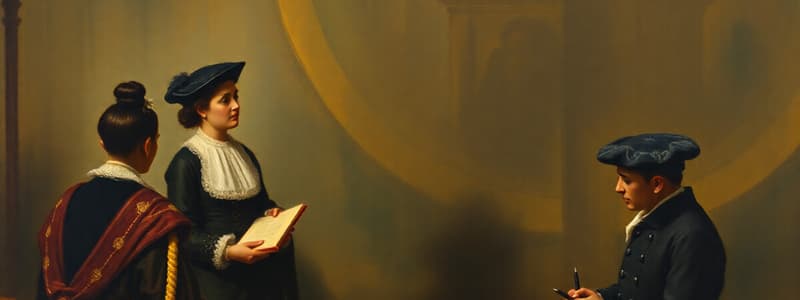Podcast
Questions and Answers
What is the main purpose of RA 1425?
What is the main purpose of RA 1425?
- To support the rise of communism in the Philippines
- To mandate the study of the life and works of Dr. Jose Rizal (correct)
- To promote freedom of speech in schools
- To establish new educational policies in higher education
When was the Rizal Law approved?
When was the Rizal Law approved?
- December 30, 1947
- July 4, 1946
- August 21, 1966
- June 12, 1956 (correct)
Which of the following was a concern expressed by the Catholic Bishops of the Philippines regarding the Rizal Law?
Which of the following was a concern expressed by the Catholic Bishops of the Philippines regarding the Rizal Law?
- It promotes communism among students
- It disregards Rizal's historical significance
- It includes passages in Rizal's novels deemed offensive to Catholic doctrine (correct)
- It requires teaching religion in schools
What historical context influenced the creation of RA 1425?
What historical context influenced the creation of RA 1425?
What did Senator Claro M. Recto advocate for regarding the Rizal Law?
What did Senator Claro M. Recto advocate for regarding the Rizal Law?
What is one goal of studying the Rizal subject beyond the legal mandate?
What is one goal of studying the Rizal subject beyond the legal mandate?
Which of the following statements accurately reflects the attitude towards the Rizal Law upon its passage?
Which of the following statements accurately reflects the attitude towards the Rizal Law upon its passage?
What was seen as an urgent need in the Philippines during the 1950s that led to the passage of RA 1425?
What was seen as an urgent need in the Philippines during the 1950s that led to the passage of RA 1425?
What was the primary aim of RA 1425 in the context of Philippine education?
What was the primary aim of RA 1425 in the context of Philippine education?
What were the concerns raised by the Catholic Bishops regarding Rizal's novels?
What were the concerns raised by the Catholic Bishops regarding Rizal's novels?
Who was the main proponent of RA 1425?
Who was the main proponent of RA 1425?
What was one of the key points of contention surrounding the Rizal Law?
What was one of the key points of contention surrounding the Rizal Law?
What does the study of the Rizal subject aim to accomplish for Filipino students?
What does the study of the Rizal subject aim to accomplish for Filipino students?
Why is the study of the Rizal subject deemed mandatory?
Why is the study of the Rizal subject deemed mandatory?
What was a significant argument made by Senator Claro M. Recto regarding Rizal's novels?
What was a significant argument made by Senator Claro M. Recto regarding Rizal's novels?
What was the societal context surrounding the debates over RA 1425 in the 1950s?
What was the societal context surrounding the debates over RA 1425 in the 1950s?
Flashcards
RA 1425
RA 1425
The Rizal Law, mandating the study of Jose Rizal's life and works in Philippine schools and universities.
Historical Context of RA 1425
Historical Context of RA 1425
The circumstances surrounding the passage of the law, including Cold War anxieties and need for Filipino nationalism.
Rizal's Life and Works
Rizal's Life and Works
The subject matter of the required study under RA 1425, encompassing Jose Rizal's experiences and writings.
Nationalism in RA 1425
Nationalism in RA 1425
Signup and view all the flashcards
Senator Claro M. Recto
Senator Claro M. Recto
Signup and view all the flashcards
Catholic Bishops' Opposition
Catholic Bishops' Opposition
Signup and view all the flashcards
Importance of Rizal Study
Importance of Rizal Study
Signup and view all the flashcards
Cold War
Cold War
Signup and view all the flashcards
RA 1425
RA 1425
Signup and view all the flashcards
Rizal Law
Rizal Law
Signup and view all the flashcards
Noli Me Tangere and El Filibusterismo
Noli Me Tangere and El Filibusterismo
Signup and view all the flashcards
Unexpurgated Editions
Unexpurgated Editions
Signup and view all the flashcards
Historical Context of RA 1425
Historical Context of RA 1425
Signup and view all the flashcards
Contentious Issue of 1950s
Contentious Issue of 1950s
Signup and view all the flashcards
Catholic Bishops' Objection
Catholic Bishops' Objection
Signup and view all the flashcards
Senator Claro M Recto
Senator Claro M Recto
Signup and view all the flashcards
Study Notes
Introduction to the Course RA 1425
- Rizal Law (RA 1425) mandates the study of the life, works, and writings of Dr. Jose Rizal in all schools.
- The law was approved on June 12, 1956 (Philippines Independence Day).
- It aims to instill nationalism, freedom, love of country, and patriotism in students.
- The law faces controversy and criticism, but it's important for Filipinos to learn from Rizal's role in attaining freedom.
- This chapter focuses on the history, objectives, and mandate of the Rizal Law.
Learning Objectives
- Students will be able to explain the background and context of RA 1425.
- Students will be able to critically assess the effectiveness of the Rizal Course.
Historical Background and Context of RA 1425
- The 1950s context of RA 1425 involved tensions surrounding communism in East Asia and the Philippines.
- Nationalism and patriotism were in need of rekindling in the Philippines.
- Senator Claro M. Recto and the Catholic Bishops of the Philippines held opposing views on the bill.
- The CBCP argued against the bill due to passages in the novels that violated the separation of Church and state.
- Recto argued the importance of the law to the Filipinos, highlighting historical flaws and the need for the youth to understand history.
- Senator Jose P. Laurel's compromise bill addressed the controversies and disagreements.
Why Study Rizal?
- It's mandated by law.
- The lessons in the course are applicable to daily life and nation-building.
- The course emphasizes the importance of Rizal's life, works, and writings in contemporary society.
- It aims for students to apply Rizal's ideals to current issues.
- It also seeks a deeper understanding of Rizal's struggles and the pursuit of freedom.
- The course encourages youth participation in all aspects of good governance and citizenship.
Studying That Suits You
Use AI to generate personalized quizzes and flashcards to suit your learning preferences.




